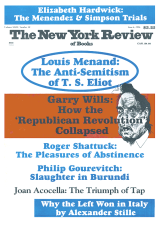In response to:
Home Fires from the May 9, 1996 issue
To the editors:
Reviewing Drew Gilpin Faust’s Mothers of Invention in your May 9 issue, Bertram Wyatt-Brown cites a 1960 article in which I supposedly said of the American Civil War “that nothing new remained to be said about the great conflict.”
I said nothing of the kind—and my record of publication over the past three decades indicates my continuing belief that the Civil War era is one of the most exciting periods in American history. My brief essay, “American Historians and the Causes of the Civil War,” dealt exclusively with the literature on the origins of that conflict and suggested that historians had failed to come up with any fresh interpretations of its causes.
This is a point I am still willing to argue—though it is hard to see what relevance it has to Professor Faust’s admirable study of Confederate women.
David Herbert Donald
Charles Warren Professor of
American History
Harvard University
Cambridge, Massachusetts
Bertram Wyatt-Brown replies:
Professor Donald correctly observes that his remarks in 1960 referred to an absence of new interpretations for the coming of the war, not, as Iimply, the entire war period. Moreover, as he himself points out, his own “record of publication,” as I wrote in the same paragraph, has demonstrated the continuing vitality of Civil War studies. How much poorer our scholarship would be without the inspiration of Donald’s achievements.
On the other hand, fortunately for us, Donald’s pessimism in 1960 about a “dead” topic like Civil War causation turned out to be groundless. Our appreciation of the causes of the war has been made richer and more complex by, among other factors, theories of how modernization took place and how political parties were organized and collapsed, as well as by new perceptions of the importance of sectional and national honor. All of that historical work, of course, was linked to the central problem of slavery in American society.
I regret any misunderstanding that may have arisen from my reference to David Donald and I’m glad that he and I agree that Drew Faust has composed “an admirable study of Confederate women,” as he puts it.
This Issue
June 6, 1996



